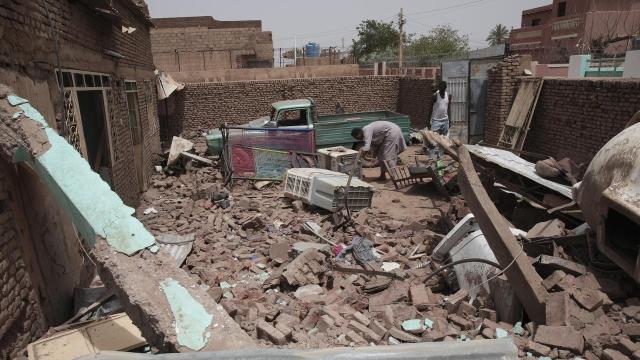Sudan capital rocked by air strikes, looting

By ![]()
KHARTOUM, (Reuters) – Residents of Sudan’s capital reported heavy air strikes in central Khartoum on Tuesday amid a surge in looting while Saudi Arabia said negotiators were working toward a short-term ceasefire.
Witnesses said the army unleashed intense air bombardment in the centre of Khartoum and around the presidential palace. The rival Rapid Support Forces (RSF) paramilitary said the palace, which it claims to control, was hit by an air strike and destroyed, but an army source denied the claim.
The two forces, which have failed to abide by repeated truce deals, sent representatives to talks in the Saudi port city of Jeddah on Saturday.
In the first report on the talks thus far, the Saudi foreign ministry said on Tuesday that the negotiations aimed to reach “an effective short-term ceasefire”, Saudi state TV Al-Ekhbariya said.
Amid warnings that Sudan is on the brink of a humanitarian catastrophe, U.N. aid chief Martin Griffiths proposed the warring parties back a declaration guaranteeing safe passage of aid supplies and the proposal has been discussed in Jeddah, a U.N. spokesperson said.
Griffiths “hopes the declaration can be endorsed as soon as possible so that the relief operation can scale up swiftly and safely to meet the needs of millions of people in Sudan,” Deputy U.N. spokesperson Farhan Haq told reporters.
The United Nations estimates that 5 million additional people will need emergency assistance inside Sudan while 860,000 are expected to flee to neighbouring states that were already in crisis at a time when rich countries have cut back on aid.
The World Health Organisation on Tuesday raised the confirmed death toll in the conflict to more than 600, with 5,000 injured, though the true figure is thought to be much higher.
Homes, shops and warehouses have all been targeted, residents said. Sudan’s Banks Union condemned burglary and vandalism at some branches, saying banks were seeking to restore services if conditions allowed.
The eruption of conflict between Sudan’s army and RSF risks a prolonged war that could draw in outside powers and unleash a new humanitarian crisis across the region.
The army, under General Abdel-Fattah al-Burhan, and the RSF under General Mohamed Hamdan Dagalo, known as Hemedti, had joined forces in a military coup in 2021, reconfiguring a planned transition to civilian rule.
But the rival military factions fell out over the terms and timing of the transition, leading to the sudden explosion of fighting in Khartoum in April that quickly spread to the Darfur region where a conflict had already rumbled since 2003.
U.S. Secretary of State Antony Blinken said on Tuesday the U.S. will not give up the goal of putting Sudan back on track to civilian democratic governance, adding that Washington is working in Jeddah for a ceasefire and agreement on humanitarian aid.
Burhan said in a phone interview with an Egyptian TV station on Monday that the talks in Jeddah were aimed at relieving pressure on civilians, not at any political settlement. He accused the RSF of cutting off power and telecoms in areas they controlled.
The RSF has said in statements that it is seeking to keep services running in Khartoum and has rejected reports of looting and other abuses. It said on Tuesday that the army had been hitting residential areas with air strikes.